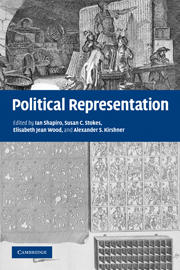Book contents
- Frontmatter
- Contents
- List of figures
- List of tables
- List of contributors
- Preface
- Editors' introduction
- Part I Representation before representative democracy
- Part II Theories of political representation
- Part III Representation and inherited injustice
- 6 Critical liberalism
- 7 Settlers and natives in North America
- Part IV What role for representative quotas?
- Part V Preferences, persuasion, and democratic representation
- Index
- References
6 - Critical liberalism
Published online by Cambridge University Press: 05 June 2012
- Frontmatter
- Contents
- List of figures
- List of tables
- List of contributors
- Preface
- Editors' introduction
- Part I Representation before representative democracy
- Part II Theories of political representation
- Part III Representation and inherited injustice
- 6 Critical liberalism
- 7 Settlers and natives in North America
- Part IV What role for representative quotas?
- Part V Preferences, persuasion, and democratic representation
- Index
- References
Summary
Representative democracies struggle with the demands of ethnic minorities. In the last decade of the twentieth century, these struggles were exacerbated by the rise of new cultural claims and claimants. Democratization engendered discussions about citizenship and membership, which raised questions of national identity and belonging. The Soviet Union disintegrated as its component units exercised their rights to national self-determination; the European Union attempted to develop new standards for the protection of minorities; and indigenous rights were enshrined in international law. The demands of ethnic minorities punctuate the political landscape in rural and urban areas, in developed and developing countries, in the East and in the West, reshaping the terms of political debate, and raising new points of political contestation.
Liberal democrats worry about this political turn. They worry about the extent to which democracies can accommodate the competing claims of ethnic groups, and they worry about their obligations to do so. They are concerned in particular because they believe that demands for bilingual education, autonomy, and cultural respect represent fundamental demands for the recognition of human identity, and that they therefore engage a deeper level of commitment than other claims. As such they impose greater obligations on the democratic state. They also pose a greater threat, as democratic institutions struggle to process and accommodate the deeply held but incompatible cultural commitments of their citizens.
- Type
- Chapter
- Information
- Political Representation , pp. 139 - 158Publisher: Cambridge University PressPrint publication year: 2010



